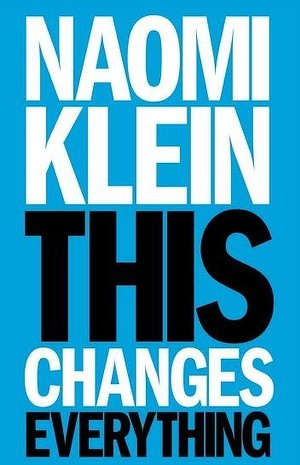Capitalism vs The Climate
Naomi Klien's "This Changes Everything: Capitalism vs The Climate" (2014) is not a case for how climate change is real or important to consider, it is a call to action. From a research perspective, I was not overly impressed with the book. However, a few chapters into my reading I realized I had approached the book incorrectly. This is not a research book by a researcher; Naomi is an activist and this book is calling for action. It is a book about how the author thinks the public can change the ways things work. It is not the pragmatic, middle of the road argument. It is to "move the ideological pole far away from the stifling market fundamentalism that has become the greatest enemy to planetary health" (p. 26).
The main reason why action has not yet occurred, despite the consensus about climate change, is "those things fundamentally conflict with deregulated capitalism, the reigning ideology for the entire period we have been struggling to find a way out of this crisis" (p. 18). The solution, Klien argues, "is not simply that we need to spend a lot of money and change a lot of policies; it's that we need to think differently, radically differently, for those changes to be remotely possible. Right now the triumph of market logic, with its ethos of domination and fierce competition, is paralyzing almost all serious effort to respond to climate change" (p. 23). While the author makes a clear argument for the challenges that are value based, much of the book is a collection of examples of how we can transform not just those values, but also translate new values into actions.
Yet, it is not just climate change that is at issue. It is the ability for citizens to express their will using democratic systems. "The process of taking on the corporate-state power nexus that underpins the extractive economy is leading a great many people to face up to the underlying democratic crisis that has allowed multinationals to be the authors of the laws under which they operate – whether at the municipal, state/provincial, national, or international level. It is this corroded state of our political systems – as fossilized as the fuel at the center of these battles – that is fast turning Blockadia into a grassroots pro-democracy movement." (p. 361). Change is possible, and change on this scale has happened before, and the author specifically highlights the responses made to the Great Depression, the abolition of slavey and the independence movements against colonial powers, as these not only included political shifts but also economic ones (p. 545-545).
The book makes two arguments for action: support the smallscale efforts (and many examples of this are given) and use your collective power as citizens to change the system (policies and programs). Where to start? "That means cheap public transit and clean light rail accessible to all; affordable, energy-efficient housing along those transit lines; cities planned for high-density living; bike lanes in which riders aren't asked to risk their lives to get to work; land management that discourages sprawl and encourages local, low-energy forms of agriculture; urban designs that clusters essential services like schools and health care along transit routes and in pedestrian-friendly areas; programs that require manufacturers to be responsible for the electronic waste they produce, and to radically reduce built-in redundancies and obsolescences" (p. 91). Doing so "requires visionary long-term planning, tough regulation of business, higher level of taxation for the affluent, big public sector expenditure, and in many cases reversals of core privatizations in order to give communities the power to make the change they desire." (p. 95).

